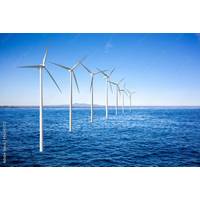Europe Power: Spot Prices Down as Wind Supply Rises
European prompt power prices fell further on Wednesday from high levels, as the prospect of higher wind power supply overrode some thermal plant losses.
German baseload power for Thursday delivery dropped by 12.3 percent to 62.3 euros ($72.03) per megawatt hour (MWh). Monday's day-ahead price had been at an 11-month high, driven by high demand and tight nuclear supply.
German wind power production is expected to rise to 6.9 gigawatts (GW) on Thursday from 2.5 GW on Tuesday and range up to 17.3 GW over the next fortnight, Refinitiv Eikon data shows. German solar power supply will be at or below 4 GW.
River levels are still low as a result of low rainfall and a summer heatwave, hampering some barge shipments to coal plants and cooling water supplies to nuclear plants, traders said.
The French day-ahead contract shed 12.4 percent to stand at 65.25 euros, a one-week low.
French nuclear capacity availability increased by two percentage points to 74.2 percent of the maximum total.
On the demand side, German power usage is expected to nudge up 300 MW to Thursday, but fall 1.1 GW on average next week compared with the Wednesday level.
French demand will be broadly stable but gain 2.9 GW on average next week when average temperatures in France could drop by six degrees Celsius from 16.2 degrees on Wednesday.
Power contracts on the forward curve fell along with coal and carbon prices.
German Cal'19 baseload power, the European benchmark, was down 0.8 percent at 52 euros/MWh.
French 2019 baseload edged 0.1 percent lower to 56.7 euros.
European December 2018 expiry CO2 allowances, which power generators must hold to cover their output, dropped 3 percent to 18.72 euros a tonne.
European delivery API2 coal for 2019, another big generation cost, fell 0.5 percent to $96 a tonne.
Broker Marex Spectron said in a research note that supply in the Atlantic was tighter but this was outweighed by higher supply in the Pacific. There would be a further build-up in consumer country stocks and the macro environment was marginally bullish, if only for now, it said.
In eastern Europe, the Czech day-ahead contract that tracks its German counterpart lost 11.9 percent to stand at 63 euros. The year-ahead position rose minimally by 5 cents to 55.2 euros.
($1 = 0.8649 euros)
(Reporting by Vera Eckert; Editing by Jan Harvey)



